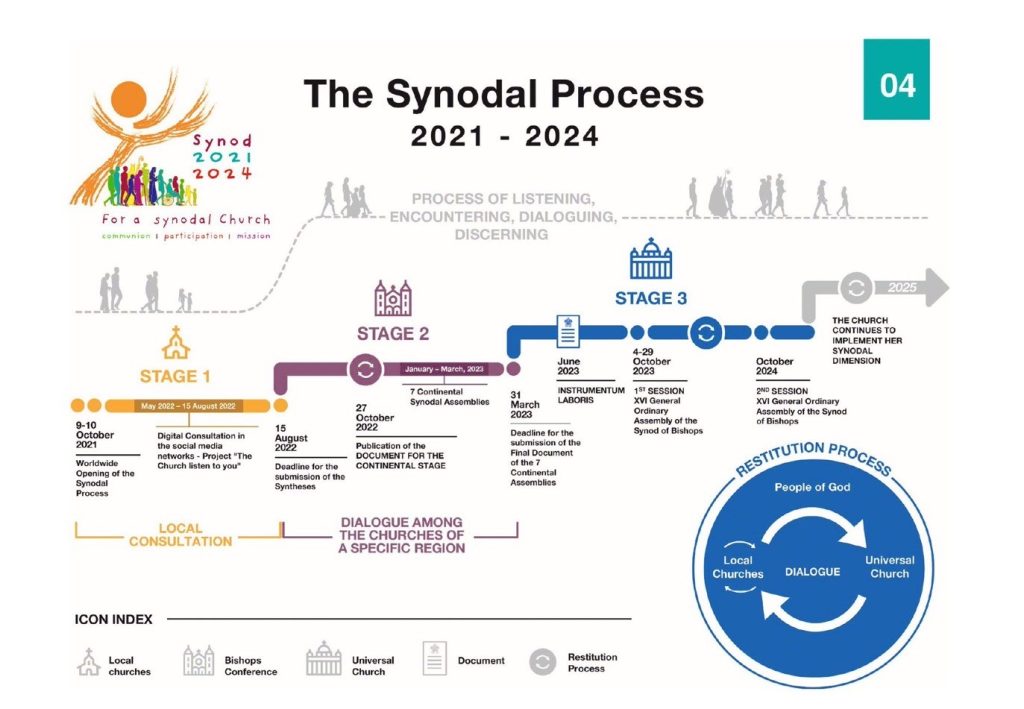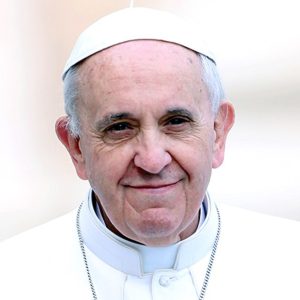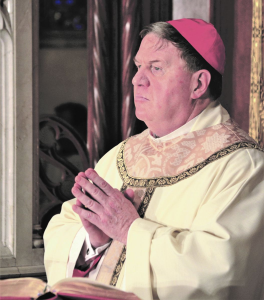From the Cardinal: Co-responsibility in mission, How we can better share gifts and tasks in the service of the Gospel | August 11, 2023
Click a button to jump to the section:

Vol. 4. No. 23
Dear Sisters and Brothers in Christ,
“Co-responsibility” is fundamental to the teaching of the Church as reaffirmed by the Second Vatican Council. Every baptized person is responsible for carrying out the mission entrusted to the disciples by our Lord: “Go, therefore, and make disciples of all nations, baptizing them in the name of the Father, and of the Son, and of the Holy Spirit, teaching them to observe all that I have commanded you. And behold, I am with you always, until the end of the age.” (Mt 28:19–20).
We are all responsible for the mission of the Church. All of us, without exception, have important roles to play in the work of evangelization. We are each, in our own ways, called to be Spirit-filled evangelizers who proclaim the joy of the Gospel in what we do and say as missionary disciples of Jesus Christ our Redeemer. No single individual can accomplish the work of evangelization on her or his own. As Pope Francis teaches in Evangelii Gaudium (The Joy of the Gospel), “A spirit-filled evangelization is one guided by the Holy Spirit, for he is the soul of the Church called to proclaim the Gospel.” The activity of the Holy Spirit is essential. If we’re not sure we have it, then the solution is to pray for it.
It’s true that there are distinctive roles assigned to different members of the one Body of Christ. As St. Paul tells us (1 Cor 12: 4–11):
There are different kinds of spiritual gifts but the same Spirit; there are different forms of service but the same Lord; there are different workings but the same God who produces all of them in everyone. To each individual the manifestation of the Spirit is given for some benefit. To one is given through the Spirit the expression of wisdom; to another the expression of knowledge according to the same Spirit; to another faith by the same Spirit; to another gifts of healing by the one Spirit; to another mighty deeds; to another prophecy; to another discernment of spirits; to another varieties of tongues; to another interpretation of tongues. But one and the same Spirit produces all of these, distributing them individually to each person as he wishes.
All of us are co-responsible members of Christ’s Body, the Church. Each of us has a role to play, as Paul reminds us (1 Cor 12:28): “Some people God has designated in the Church to be, first, apostles; second, prophets; third, teachers; then, mighty deeds; then, gifts of healing, assistance, administration, and varieties of tongues.”
We are not all apostles or prophets or teachers, St. Paul teaches, but we are all responsible because we are all members of one Body and “if [one] part suffers, all the parts suffer with it; if one part is honored, all the parts share its joy.”
The fact that we have different responsibilities in the missionary task assigned to us by our Lord means that we must share generously with others both our gifts and our challenges in carrying out this great work. Synodality is nothing more, or less, than the acknowledgment that we are all in this together and that success requires that we collaborate in being and doing our evangelical duties as God’s faithful people journeying together toward our heavenly homeland.
The working document (Instrumentum Laboris) for the first session of the Synod in October 2023 reminds us that the Second Vatican Council taught that “the pilgrim Church is missionary by her very nature” (Ad gentes # 2). Participation in the Church’s mission “allows one to receive the experience of Pentecost: having received the Holy Spirit.” When we accept our co-responsibility for the mission of the Church, we open ourselves to receiving (or renewing our reception of) the gifts of the Holy Spirit that make us bold, creative and generous evangelizers.
Each of us has something to contribute, to share with others, in the work we are called to do as missionary disciples. And, at the same time, as the Synod’s working document makes clear, “each person is invited to acknowledge his or her own incompleteness, and therefore the awareness that in the fullness of mission everyone is needed.” In this sense, the document continues, mission also has a constitutively synodal dimension.
The spirituality of Christian stewardship emphasizes that everything we have, and all that we are, comes to us as pure gift from a generous God whose very nature it is to share with us the beauty and wonder of Creation. As co-responsible stewards of God’s abundant goodness, we are invited, and challenged, to share generously all our gifts and talents to build up God’s kingdom and to ensure that all nations and peoples receive the Gospel of Joy.
As we continue our synodal journey, let’s ask the Holy Spirit to fill our hearts with the fire of God’s love. And let’s boldly and courageously accept our individual roles in carrying out the Great Commission to share the Good News with all our sisters and brothers in the one family of God.
Sincerely yours in Christ the Redeemer,
Cardinal Joseph W. Tobin, C.Ss.R.
Archbishop of Newark

Instrumentum Laboris
A selection from INSTRUMENTUM LABORIS For the First Session (October 2023)
B 2. Co-responsibility in Mission: How can we better share gifts and tasks in the service of the Gospel?
51. “The pilgrim Church is missionary by her very nature” (AG 2). Mission constitutes the dynamic horizon from which we are to think about the synodal Church, to which it imparts a drive towards the “ecstasy” that consists in “coming out of ourselves and seeking the good of others, even to the sacrifice of our lives” (CV 163; cf. also FT 88). Mission allows one to receive the experience of Pentecost: having received the Holy Spirit, Peter and the Eleven stand and take the word to announce the crucified and risen Jesus to all those living in Jerusalem (cf. Acts 2:14-36).
Synodal life is rooted in the same dynamism. There are many testimonies that describe the lived experience of the first stage in these terms, and even more numerous are those that link synodality and mission in an inseparable manner. 52. In a Church that defines itself as a sign and instrument of union with God and of the unity of all humanity (cf. LG 1), the discourse on mission focuses on the lucidity of the sign and the efficacy of the instrument, without which any proclamation lacks credibility. Mission is not the marketing of a religious product, but the construction of a community in which relationships are a manifestation of God’s love and therefore whose very life becomes a proclamation.
In the Acts of the Apostles, Peter’s discourse is immediately followed by the account of the life of the primitive community, in which everything became an occasion for communion (cf. 2:42-47), which made the community attractive. 53. In this line, the first question regarding mission asks what the members of the Christian community are really willing to hold in common, starting from the irreducible uniqueness of each member, by virtue of their direct relationship with Christ in Baptism and as a dwelling place of the Spirit.
This makes the contribution of each of the Baptized precious and indispensable. One of the reasons for the sense of wonder noted during the first phase is related to this possibility of contribution: “Can I really offer something?”. At the same time, each person is invited to acknowledge his or her own incompleteness, and therefore the awareness that in the fullness of mission everyone is needed. In this sense, mission also has a constitutively synodal dimension.
54. For this reason, the second priority identified by a Church that discovers itself as missionary and synodal concerns the manner in which it is able to solicit the contribution of all, each with their gifts and roles, valuing the diversity of charisms and integrating the relationship between hierarchical and charismatic gifts8. The perspective of mission places charisms and ministries within the horizon of what is common, and in this way safeguards their fruitfulness, which is compromised when they become prerogatives that legitimize forms of exclusion. A missionary synodal Church has a duty to ask itself how it can recognize and value the contribution that each Baptized person can offer in mission, going out of himself/herself and participating together with others in something greater. “[T]to make an active contribution to the common good of humanity” (CA 34) is an inalienable component of the dignity of the person, even within the Christian community.
The first contribution everyone can make is towards discerning the signs of the times (cf. GS 4), in order to maintain awareness of our common mission in tune with the breath of the Spirit. All points of view have something to contribute to this discernment, starting with that of the poor and excluded: walking together with them does not only mean responding to and taking on their needs and sufferings, but also respecting their protagonism and learning from them. This is the way to recognize their equal dignity, escaping the traps of welfarism and anticipating as far as possible the logic of the new heavens and new earth towards which we are on our way. 55. The Worksheets linked to this priority try to concretize this basic question with respect to topics such as the recognition of the variety of vocations, charisms and ministries, the promotion of the baptismal dignity of women, the role of the ordained Ministry and in particular the ministry of the Bishop within the missionary synodal Church.
For the complete text of the Instrumentum Laboris, read below or download the document.

A Message from Pope Francis: Words of Challenge and Hope
A selection from Evangelii Gaudium (the Joy of the Gospel), Chapter V., “Spirit-filled Evangelizers”
259. Spirit-filled evangelizers means evangelizers fearlessly open to the working of the Holy Spirit. At Pentecost, the Spirit made the apostles go forth from themselves and turned them into heralds of God’s wondrous deeds, capable of speaking to each person in his or her own language. The Holy Spirit also grants the courage to proclaim the newness of the Gospel with boldness (parrhesía) in every time and place, even when it meets with opposition. Let us call upon him today, firmly rooted in prayer, for without prayer all our activity risks being fruitless and our message empty. Jesus wants evangelizers who proclaim the good news not only with words, but above all by a life transfigured by God’s presence.
260. In this final chapter, I do not intend to offer a synthesis of Christian spirituality, or to explore great themes like prayer, Eucharistic adoration or the liturgical celebration of the faith. For all these we already have valuable texts of the magisterium and celebrated writings by great authors. I do not claim to replace or improve upon these treasures. I simply wish to offer some thoughts about the spirit of the new evangelization.
261. Whenever we say that something is “spirited”, it usually refers to some interior impulse which encourages, motivates, nourishes and gives meaning to our individual and communal activity. Spirit-filled evangelization is not the same as a set of tasks dutifully carried out despite one’s own personal inclinations and wishes. How I long to find the right words to stir up enthusiasm for a new chapter of evangelization full of fervor, joy, generosity, courage, boundless love and attraction! Yet I realize that no words of encouragement will be enough unless the fire of the Holy Spirit burns in our hearts. A spirit-filled evangelization is one guided by the Holy Spirit, for He is the soul of the Church called to proclaim the Gospel. Before offering some spiritual motivations and suggestions, I once more invoke the Holy Spirit. I implore him to come and renew the Church, to stir and impel her to go forth boldly to evangelize all peoples.
(Source: www.vatican.va/evangelii-gaudium/en/files/assets/basic-html/page193.html)
My Prayer for You

Please join me in praying these words of Pope Francis from the conclusion of Evangelii Gaudium:
Mary, Virgin and Mother,
you who, moved by the Holy Spirit,
welcomed the word of life
in the depths of your humble faith:
as you gave yourself completely to the Eternal One,
help us to say our own “yes”
to the urgent call, as pressing as ever,
to proclaim the good news of Jesus. Amen.
